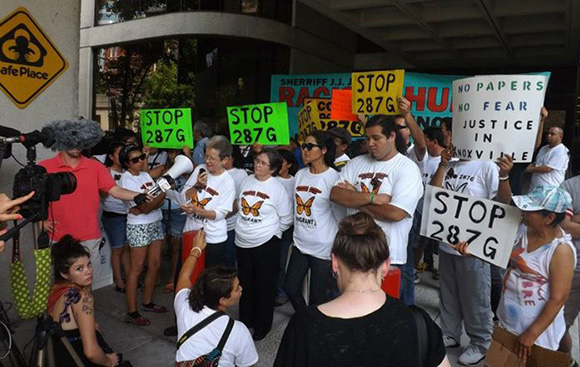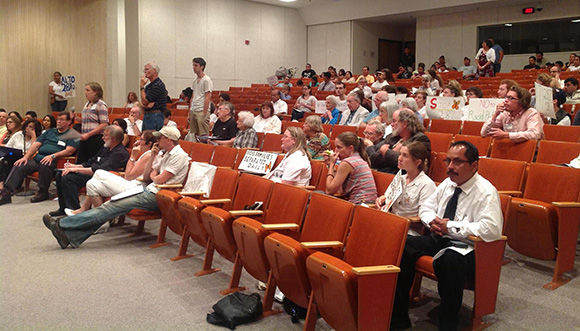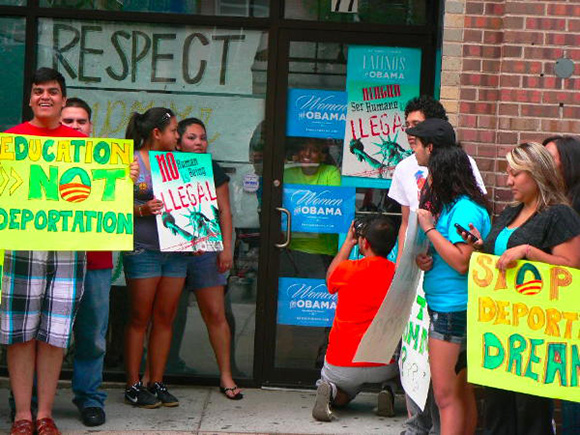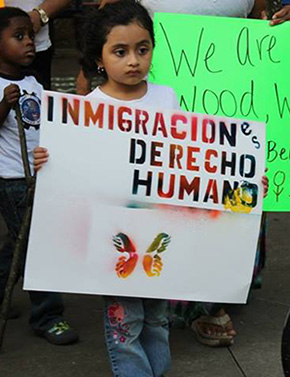by Alex Greene
December 18, 2013
This article is an attempt to critically reflect on some of the work I’ve been involved with in Knoxville over the past several years. The first part is a narrative account of the campaign against 287(g) in Knox County. The rest of the article is my attempt to draw broader lessons from that work, and to consider important questions around the immigrant rights movement and legislative reform efforts more broadly.
The Battle Against 287(g)

In March of 2012, not long after Obama had stated there would be no new 287(g) agreements and that Immigration and Customs Enforcement (ICE) would be focusing on the Secure Communities program instead, activists in Knoxville received word that ICE had accepted an applications for a 287(g) program from the Sheriff of Knox County. (287(g) allows local law enforcement to operate as an immigration authority, granting them the power to investigate the immigration status of anyone taken into custody, among other things.) Given Obama’s statements and the lack of any new 287(g) programs in several years, most of us assumed that federal authorities were backing away from 287(g) in an attempt to streamline and unify enforcement policy and avoid more pressure and embarassment around the program, so the announcement took local groups by surprise.
It was clear that this would not only be an important struggle for our city, but could have important ramifications for the movement as a whole. If ICE could slide a new 287(g) agreement under the radar in a supposedly right-wing county, their success might undo what had seemed to be a longer term victory against 287(g) just a couple years earlier.
The news about 287(g) in Knoxville also came on the heels of a similar struggle against the program in Nashville, where an agreement was already in place. Activists in Nashville had been fighting for years to get 287(g) repealed in their city, and they were ultimately successful after a particularly awful case where a pregnant woman who had been arrested for driving without a license, and put into local immigration proceedings as allowed by 287(g), was forced to go through childbirth while shackled to her hospital bed in handcuffs. The city eventually decided that the high legal costs (they paid out a six figure settlement in the above case), the public embarrassment, and the constant pressure from activists were more trouble than it was worth to have just one more tool for attacking immigrants.

A demonstration in July 2012, a couple months after the announcement about 287(g).
The local immigrant rights organizations–the Comité Popular, an organization of Latin@ immigrants which now meets independently and in Spanish, and AKIN, Allies of Knoxville’s Immigrant Neighbors, a multi-racial ‘allies organization–moved to organize a response.1 We hoped to point to the experiences of cities like Nashville (and there are many other similar stories of 287(g) programs) and convince local officials that it was a bad idea. The assumption most of us made was that ICE was calling the shots, that this was their game and that local officials, in particular Sheriff “J.J.” Jones who had applied for the agreement, would be more willing to listen or at least more vulnerable to pressure. (In retrospect, this was a strategic mistake; more on that later.)

Activists hold a press conference outside of the Sheriff’s office.
After a series of delegations to the Sheriff’s office and innumerable phone calls asking for a meeting, it became increasingly clear that the man was not so interested in dialogue. Even after several large demonstrations near his office and a good deal of media attention, he never agreed to a meeting, citing a need to meet with ICE and finalize the details of a Memorandum of Understanding (MoU) first. Long story short, we eventually stopped getting updates on the process with ICE, and the issue died down. An agreement wasn’t signed, and we assumed the Sheriff had decided to quietly back down to save face while also not having to concede publicly.
Almost a year later, however, we got an announcement that the Sheriff was holding a public forum to receive final input before signing the 287(g) agreement. He had the MoU in hand and was prepared to sign. With something like a week’s notice or less, we organized well over a hundred people to show up at the forum, and for two hours one community member after another spoke movingly about why the Sheriff shouldn’t sign the agreement. Not a single person showed up to speak in favor of the program. But the Sheriff wouldn’t budge; he just looked bored while people poured their hearts out in front of him. (For a longer summary, see my article on the forum.)

Community members opposed to 287(g) filled the crowd at the Sheriff’s public forum.
Demoralized at the realization that the Sheriff was probably never going to budge and that we had probably chosen the wrong target, we consciously turned a lot of our efforts toward other targets in what felt like a desperate attempt to find somebody out there who was more reasonable, or more scared of opposition, than our Sheriff. Some people wanted to focus on local officials, including our progressive mayor and progressive city council members, in the hope that they could intervene or pressure the Sheriff more effectively than we could; others thought we should focus on ICE and other federal officials and hope that we could demonstrate enough public opposition that they’d withdraw. We knew we had a timetable of a few weeks to a month or two at most and didn’t have time to really talk through these things or come to consensus on a strategy, so we basically just went for “all of the above.”
To be very clear: we did not expect this to work. Sheriff Jones was clearly not going to back down, and it seemed too late to effectively pursue a different strategy (although, in retrospect, we had already laid the groundwork for a different strategy through the public pressure and media attention we had won, and ICE was surely aware of this). So we were more than a little surprised when after a couple of months a source in the Department of Homeland Security told us ICE had “no plans to sign the agreement” and when that news was confirmed shortly after by a formal announcement from ICE that they had rejected the application.
Drawing Lessons
Local groups still haven’t had the space to step back and adequately reflect on this victory and what it means, why it happened. The need to do so is in large part why I decided to write this reflection; I am, to a significant extent, just working through these ideas and trying to learn from experience, so some of the ideas here are as much conjecture as confident analysis. I don’t claim to speak for anyone else, and certainly not everyone I work with would agree with everything in this article, but I do want to acknowledge that most of what I know and think about these issues I’ve learned from sharper and better organizers in the movement, particularly from undocumented leaders. I deserve little if any individual credit for most of the ideas here.
American Idol was setting up for auditions during one of our demonstrations.
One thing that’s clear is that it was a mistake to zero in on a single local target, the Sheriff, and make him the sole bad guy. I say this not just because it didn’t work out strategically—sometimes it’s hard to know in advance how a person in power will respond to pressure, though in this case we should have realized the mistake long before we did—but because the issues here are a lot bigger than one racist law enforcement official with an anti-immigrant chip on his shoulder. There is a whole system of power and wealth that benefits from the exploitation and dehumanization of immigrants (and from the creation of artificial categories like “citizen” or “legal resident” in the first place, when many of the “immigrants” in question are in fact First Nations people who have lived on this land for far longer than the white colonizers who now make the rules and decide who gets to stay). The 287(g) program is just one manifestation of that system, and Knox County’s Sheriff is just a symptom of it.

It is not low-level, racist politicians who truly benefit from this system, and we should have been saying that all along. The right-wing is able to win people to their politics because they have a narrative which, however non-sensical and inconsistent it may seem on close analysis, gives people a big picture explanation of what they see and experience. That narrative draws seemingly logical connections between immigrants, the poverty and unemployment of white folks, and a whole host of other social ills, and the right is consistent about presenting their narrative. If our response is to individualize and localize every issue and just call on people’s sympathy—if we fail to produce a convincing frame of our own—then we are conceding the battle of ideas before it even begins.
Instead, we need to name the system. We need to talk about how the low to non-existent standards of pay and work conditions for immigrant labor (which are largely backed up through threat of deportation) allow the bosses to keep pay and work conditions bad for everyone else too, and argue that only by bringing everyone up together can we win sustainable victories. We need to say that migration across our borders is not because of our freedom and greatness, but largely a result of our own government’s imperialist policies in other nations; that “free trade” policies like NAFTA wipe out indigenous agriculture, that U.S.-backed civil wars destroy the infrastructure of many nations, that the domination of Latin American land use and water resources by Western corporations leaves people poor and jobless and forces immigration just for survival, and that these things will change only when we end imperialism. We need to demonstrate the artificial nature of borders and the reality that most “Americans” are in fact immigrants and many “immigrants” are in fact First Nations people descended from the original inhabitants of this land. If these ideas sound too radical to put forward in the mainstream, it is only because we’ve failed for so long to put them forward; the right-wing has taken even more radical ideas and made them utterly normal.
There is a concrete lesson here about strategic targets, too. Our assumption that individuals who were a) elected officials and b) local to our community would be easier to move was clearly a mistake. And while this is just one case, and not all people would be equally stubborn and inaccessible in Sheriff Jones’s position, I think there is something generalizable here. We need to move past the assumption that the system works how it’s supposed to: meaning, elected officials who theoretically represent a constituency are not necessarily answerable to that constituency in any significant way, and government agencies or non-government forces who are theoretically bound by a set of rules and not to public opinion are often more vulnerable than our “democratic” representatives.
It isn’t clear whether ICE decided not to sign the MoU because of the pressure we mounted locally, or because of different pressures from higher up the food chain (I would guess it was a combination of both). But it is clear that something changed: a year ago ICE was announcing that they were accepting the application, and as early as a couple months before they formally rejected it this year, they sent the Sheriff a revised MoU, which he signed and sent back to them. ICE showed every sign that they intended to move forward with this, and then backed down close to the last minute. The Sheriff himself seemed confident that ICE was going to sign, and publicly indicated that the deal was as good as made; after his application was rejected he claimed to have no warning that this was going to happen. So while we have no way of gaining clear insight into what happened within ICE, it seems plain enough that they were responding to some kind of pressure, whether local pressure against the program or national pressure around immigration reform.
The take away, for me, is that ICE and Obama are often more vulnerable than legislators or local law enforcement. This has been demonstrated repeatedly in recent months, and not just through the one example of our fight in Knoxville. We have seen a rather remarkable series of victories in anti-deportation fights, including when the Dream 9 (and later, with partial success, the Dream 30) deliberately crossed the Mexican border and re-entered the country. Activists in Florida recently won a groundbreaking neutrality agreement with ICE where the agency agreed not to respond to employers’ requests for retaliatory deportation.

DREAM activists staged actions at Obama’s campaign offices which eventually won the deferred action program (DACA).
Before all of that, it was direct pressure on Obama that won the DACA (deferred action) program; meanwhile, despite huge amounts of lobbying (as well as more militant forms of pressure) over a number of years, Congress has failed to pass any meaningful legislation at all, and state legislatures have passed almost exclusively anti-immigrant legislation. So, while there is no one right answer for every situation and a diversity of tactics is needed, it seems that targeting immigration authorities, including Obama himself, is often going to get the goods in a way that pressuring legislators and other elected officials usually won’t.
Turning Toward Immigration ‘Reform’
Following the defeat of 287(g), activists in Knoxville were faced with the question of where to go next. The Sheriff had made a shocking public statement about the rejection of his request for the program in which he promised to “stack these violators like cordwood in the Knox County jail.” Local groups organized a public demonstration protesting the Sheriff’s not-so-veiled threats, and staffers from ally groups in the state worked to bring national attention to the Sheriff’s remarks. It was clear that this was an opportunity to bring broader attention to immigrant issues here, but less clear what exactly the demand was supposed to be now that the threat of 287(g) was gone. There was some talk of going as far as seeking the eventual repeal of Secure Communities, but I think few if any people felt this was a serious possibility that we should pursue right away.
For better or worse, all of this occurred at the same time that the federal immigration reform process was in the national spotlight. Comité members were not exactly thrilled with the Senate’s immigration bill, but ultimately decided to support legislative reform, with the provision that messaging and demands should also include language about ending deportations, and should be more about supporting the pathway to citizenship than accepting the ugly bill wholesale. AKIN had a similar conversation but never made a formal decision about where we stood on any of the reform bills; we recognized that we had too much diversity of opinion in the group to take one stance as an organization, and have tried to make room for a variety of activity levels around reform depending on how individuals feel.
For my part, I thought at first that the Senate bill was worth passing, or at least that if immigrant leaders decided it was worth supporting, then ‘ally’ activists had something of a responsibility to support that work. As the “reform” process in the House has moved forward (or backward) and I’ve seen how the discussions have played out locally, however, I’ve grown more and more convinced that there’s no real hope of getting legislation in the near future that would represent a clear net positive. (Leaders in the House have more or less confirmed this is the case with announcements that reform won’t come this year, but that is surely not the last we will hear of Congressional reform–there is already buzz that Boehner has hired a “top adviser” on immigration reform and seems to be preparing for another go-round early next year–so these questions are still important to consider.)
More importantly, I’ve grown convinced that the exact contents of the legislation aren’t even that important, because its primary purpose is not to produce real reform but to provide a distraction and a venue for political power play. The immigrant rights movement with its newfound militancy represents a real threat to elements of the ruling class agenda, or could represent such a threat if it were united behind a clear set of demands. The reform process strikes me as something like a charade meant to distract and divide the movement and make sure that it doesn’t fight for anything the ruling class isn’t prepared to concede. It also provides a disingenuous path for a shrinking Republican Party to seek much-needed support from Latino voters, and position key players in the party for future elections; the Democrats need that support too, and would rather cooperate with Republicans to pass a bill they can call a victory than fail to pass anything (or—the horror!—take a real stand for meaningful legislation without bipartisan support).
Comité members meet with Representative Phil Roe.
Given the clear unwillingness of anyone with political power to fight for real reform we could feel good about supporting–even leading advocates of reform like Luis Gutierrez have backed away from support for the more radical wing of the movement–and given especially the way this one-sided reform ‘struggle’ threatens to divide and weaken the movement (and has already done so to some extent), it seems to me that we need to move on and not focus efforts on supporting federal legislation. Locally, my argument has been that we should take no formal position on the bill(s) and that people who want to do lobbying type work should feel free to do so, but that we shouldn’t focus organizational efforts on it, and I think that is a good line in general: we don’t want to divide the movement either by supporting unfortunate legislation or by openly opposing it, so let’s find a positive program we can all get behind and then let individuals do as they will in terms of relating to existing federal reform proposals.
Strategically, I think it makes more sense to focus demands on Obama, ICE, and other executive branch and business-world targets than on legislators. Recent experience suggests it’s more possible to win real victories against these targets, and it avoids the endlessly drawn out mire of legislative politics which only ever seems to break down movements and ultimately fail to deliver.

To be clear, I do think it is important to take advantage of the moment when immigration reform is in the media spotlight. The point is that we should make positive demands about the things we really want—an end to deportations, deferred action for everyone, fair compensation and workplace rights for immigrant workers (and for everyone else!), an end to imperialist economic policies like NAFTA, respect for the rights and autonomy of First Nations, etc.—rather than making compromise demands that just support whatever happens to be the best bill Congress comes up with. We also need to be clear about what we’re asking for: “citizenship” is a vague idea that doesn’t necessarily imply all the rights we associate with it, so we need to name those rights and fight for them directly instead of substituting the idea of citizenship in the abstract. We know we’re not about to get everything we want, but we can make sure we take advantage of the moment to set the stage for continuing struggles.
The health care reform struggle illustrates this point: during the debate around health care several years ago, social movement forces mostly followed the strategy of supporting the best current proposal around healthcare, and now we’re stuck with Obamacare, which nobody on either end of the political spectrum is really happy with anymore. If we had seriously fought for single payer and lost, we’d now be in a position to return to that fight, but as it is there’s near zero consciousness about any alternative to Obamacare and so there’s no ground on which to continue the fight. The immigrant rights movement has generally been better about not being led around by the nose by politicians, thanks especially to the militancy of young immigrant activists, but there’s still a danger that we’ll miss the chance to reach a wide audience with a message about what really just immigration reform might look like.
Militant undocumented activists are already making some or all of these demands, and winning groundbreaking victories through innovative direct action, even with very small numbers of people (for example, the recent wave of “Not 1 More” anti-deportation actions targeting ICE directly). There is real power in this movement, and if most of the rest of the immigrant rights movement could unite behind the demands and tactics already being pioneered by this wing of the movement, that power could be far greater still.
1As a documented white person, I am formally a member of AKIN, but I have also often been present at Comité meetings and events. I say “we” in this article in reference to both groups, but I want to be clear that I don’t think the experiences of documented activists are at all equivalent to undocumented immigrant activists. I don’t have space in this article to adequately reflect on what it means to be an “ally” or the different roles of non-immigrants (or documented immigrants) in the movement, but these are important questions and I hope to address some of them in a follow up piece.
Alex is a Solidarity member in Knoxville, TN. He is one of the editors of this webzine, and a member of Solidarity’s National Committee.
